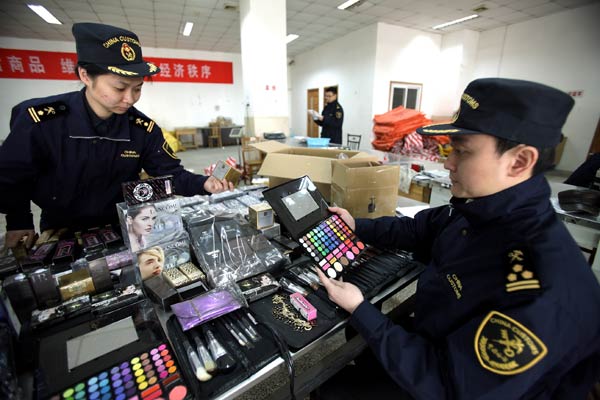Photos
Property rights linked to innovation
Updated: 2011-04-26 08:10
By Wang Jingqiong (China Daily)
CHANGZHOU, Jiangsu - China must do more to protect intellectual property rights or its economy will remain too reliant on labor-intensive industries and its ability to innovate may wither away, a senior judge has warned.
|
 |
|
Nanjing Customs officials seize a batch of what are believed to be counterfeit cosmetics in Jiangsu province on Feb 9. [Chen Yinjian / for China Daily] |
"After 30 years of fast development, China should see technological innovation playing a bigger role in its economy. But severe infringements of intellectual property rights are detracting from the motives (behind innovation)," Xi said during an inspection tour in East China's Jiangsu province.
Li Xueyong, governor of Jiangsu, echoed Xi's remarks, saying Jiangsu's way of development should be changed by encouraging more technological research and innovation.
According to Li, about 10,000 companies in Jiangsu have applied for patents, a number accounting for only 3 percent of the companies in the province. And fewer than 20 percent of the companies in Jiangsu make products under their own brands.
By April 15, authorities had cracked down on 59,500 cases of trademark infringement and counterfeiting in China this year. More than 9,600 of the cases concerned foreign trademarks, Fu Shuangjian, vice-minister of industry and commerce said at the Forum on Trademarks and Enterprises Growth held in Beijing Monday.
Kong Xiangjun, president of the Supreme People's Court's Intellectual Property Tribunal, said protecting intellectual property rights in China now costs more than violating them.
The causes of that situation are complex.
"First, we do not have a tradition of protecting intellectual property rights, and most people, or even companies whose intellectual property rights have been violated, do not know how to protect them," Kong said.
"Besides, the local economy in some places relies heavily on the production of counterfeits. Because of the local interest in protecting such industries, the courts find it difficult to shut down illegal producers."
And new types of violations, especially those that occur on the Internet, pose difficulties to both the police and the courts.
Liu Liang, deputy general manager of Changzhou Software Park Development Co Ltd in Jiangsu, said he is often surprised by how fast the company's products are illegally copied. Yet he can do little to stop that from happening, he said.
"It's very difficult to find these people, and there are so many of them," Liu said. "I cannot sue everyone. Even if I win one or two lawsuits, they won't give me much compensation. So why bother?"
Hu Yongqi contributed to this story.
Specials

British Royal Wedding
Prince William and Kate Middleton married at Westminster Abbey in a royal occasion of dazzling pomp and pageantry.
Best wishes

The final frontier
Xinjiang is a mysterious land of extremes that never falls to fascinate.

Bridging the gap
Tsinghua University attracts a cohort of foreign students wanting to come to China.



